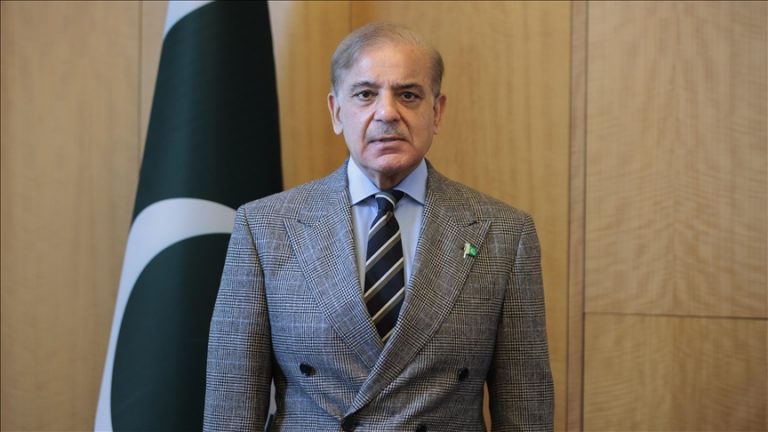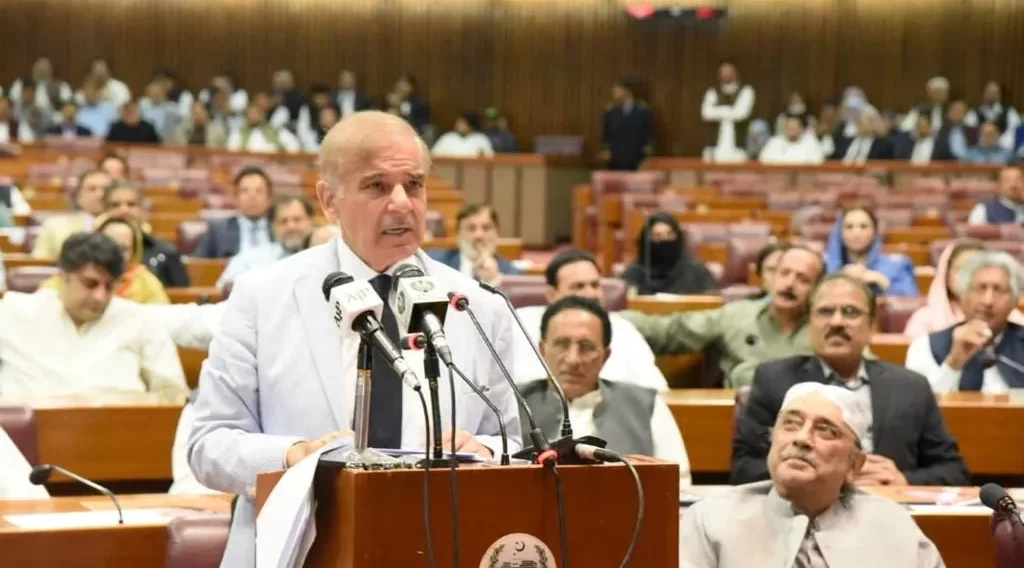
Pakistan’s parliament on Sunday elected Shehbaz Sharif as the country’s new prime minister for a second term
– Faltering economy, rising political instability, resurgence of terrorism will test new premier
– Shehbaz’s handling of economy during 16-month previous stint didn’t impress many
Aamir Latif
KARACHI, Sindh, Pakistan
Pakistan’s parliament on Sunday elected Shehbaz Sharif as the country’s new prime minister for a second term.
Shehbaz, the younger brother of three-time Prime Minister Nawaz Sharif, and president of his Pakistan Muslim League-Nawaz (PML-N) grabbed 201 votes in the lower house or the National Assembly, defeating his rival Omer Ayub Khan of Pakistan Tehreek-e-Insaf (PTI) party of jailed ex-Prime Minister Imran Khan.
The 72-year-old cancer survivor previously served as premier from April 2022 to Aug. 2023 following a successful parliamentary no-confidence vote against Khan.
Born on Sept. 23, 1951, to a Punjabi-speaking Kashmiri family in the northeastern city of Lahore, the capital of Punjab, Shehbaz is known as a “tough administrator” who, according to some analysts, knows the “art to govern.”
His administrative skills were widely recognized during his three stints as chief minister of the country’s largest and richest Punjab province, i.e. from 1997 to 199, 2008 to 2013, and 2013 to 2018.
Read: ‘War not an option’: Pakistani premier says ready for talks with ‘neighbor’
However, his 16-month stint as premier did not impress many. A faltering economy and a surging cost of living crisis, exacerbated during his tenure, brought the country to the verge of default before it secured a last-minute bailout from the International Monetary Fund (IMF) in July last year. His government, though, blamed the previous administration of Khan for the dire economic situation.
A World Bank report last week revealed that over 12 million Pakistanis have fallen below the poverty line over just the past year. Currently, almost 40% of the country’s population of some 240 million is living below the damning threshold.
Early life
The Sharif family, which hails from the Anantnag district of Indian-administered Kashmir, later settled in the city of Amritsar in the northwestern Indian state of Punjab in the early 20th century.
They eventually migrated to Lahore in 1947 following the creation of Pakistan and India as two independent states.
The family’s sprawling residence located on the northern outskirts of Lahore is named after their ancestral village “Jati Umra” in Amritsar.
Shehbaz’s father, Mohammad Sharif, an upper middle-class industrialist, started a steel business and set up a small factory on the outskirts of Lahore.
Shehbaz, the second of Sharif’s three sons, got his early education from Saint Anthony’s High School in Lahore and later attended the prestigious Government College University in the same city to earn a degree of Bachelor of Arts.
Along with his elder brother Nawaz, Shehbaz joined his family business in the early 1970s.
Read: EXPLAINED: Pakistan’s economic crisis and default risk
Their factories had been taken into state control under a controversial nationalization policy of former Prime Minister Zulfikar Ali Bhutto in 1974 but were returned in 1977 following the ouster of the Bhutto government through a military coup by then Army Chief Gen. Zia-ul-Haq.
A father of four — two sons and two daughters — Shehbaz married three times. Currently, he has two wives.
All of his children are from his first wife, Nusrat Shehbaz, whom he married in 1973.
His eldest son and political heir, Hamza Shahbaz, has also been elected as a member of the National Assembly from Lahore in the Feb. 8 elections.

Political journey
The Sharif family entered politics in the early 1980s, when the country was run under martial law.
Nawaz was the first in the family to venture into politics and joined the provincial Cabinet as the youngest finance minister under the patronage of then-Punjab Governor Gen. Ghulam Jilani.
Political opponents sarcastically call the Sharifs the “product of martial law and Gen. Jilani.”
Shehbaz was elected to the Punjab Assembly in 1988 and to the National Assembly in 1990.
He was again elected to the Punjab Assembly in 1993 and served as the opposition leader until 1996.
He was elected as chief minister for the first time in 1997, but his government only lasted for slightly over two years as then Army Chief Gen. Pervez Musharraf toppled the Nawaz Sharif government in a bloodless military coup in October 1999.
The Sharif brothers were tried for hijacking a commercial airliner in which Nawaz was sentenced to life imprisonment in April 2000 for issuing orders, which he later rescinded, telling ground control to refuse landing permission to a Karachi-bound airliner, sending it out of the country. Among those on the plane was Gen. Musharraf, who came to power that day in a coup.
Shehbaz and two other accused were acquitted.
In 2001, the Sharif family, under an agreement brokered by former Saudi King Abdullah bin Abdul Aziz, went into exile in Jeddah, Saudi Arabia, and lived there for six years.
The family returned to Pakistan in 2007, and Shehbaz got elected as Punjab chief minister for a second term in the 2008 general elections and completed his five-year term in 2013.
In 2013, he was re-elected as chief minister for a third term and served until 2018.
In 2018, he was elected as a member of the National Assembly and served as the opposition leader until Imran Khan’s ouster through a no-trust vote in April 2022.
He was chosen as the president of the Pakistan Muslim League (Nawaz group) in 2017 following the disqualification of Nawaz by the Supreme Court in the wake of the 2016 Panama Papers scandal.
As the chief minister of Punjab, he developed a reputation as an efficient administrator, particularly for his grip over bureaucracy.
Shehbaz is viewed as the pioneer of today’s Lahore, one of Pakistan’s developed cities.
He is particularly admired for the development of the communication and transport system across the province, including in small and rural areas.
The Sharifs have often been accused of involvement in corruption. Together with Nawaz, Shehbaz and his two sons have been facing several corruption cases.
The rise of their businesses during their stints raised eyebrows. They, however, deny the charges and term the cases “political victimization.”
Tilt towards China, Türkiye
Sharif has called for improving ties with the US, calling them critical for Pakistan, a noticeable departure from Khan’s frosty relations with Washington, which he accuses of orchestrating his ouster.
According to analysts, Shehbaz has a tilt towards Pakistan’s longtime allies China and Türkiye.
The $64 billion China-Pakistan Economic Corridor project, a part of China’s Belt and Road Initiative, was signed during senior Sharif’s tenure in 2015.
Shehbaz tried to follow the Turkish model in terms of the development of Punjab during his last stint.
A number of Turkish and Chinese companies are engaged in projects in Punjab that were initiated during Shehbaz’s tenure.
Several important points in Lahore have been named after Turkish President Recep Tayyip Erdogan, former President Abdullah Gul and Istanbul city.
Confluence of challenges ahead
Analysts observe that a confluence of challenges – faltering economy, rising political instability, and the looming threat of a resurgence of terrorism – will test Sharif for the next five years.
Shahid Hasan Siddiqui, a Karachi-based economist, observes that fixing the country’s economy, which is currently in horrible shape, will be the biggest challenge for Sharif.
“It’s a bumpy ride ahead for the new premier. We should not expect a miracle as far as the economy is concerned, at least for the initial few years,” Siddiqui told Anadolu.
As already hinted by Shehbaz himself, the new government has to negotiate with the IMF for another program to keep the economy afloat, according to Siddiqui.
On the political front, many do not see a thaw in escalating tensions on the horizon, with the Feb. 8 polls marred by rigging allegations from PTI and other parties, charges that the caretaker government and electoral authorities denied.
Read: Pakistan and the Game of Thrones
“Without political stability, it will not be possible for the new government to focus on fixing the economy,” Maleeha Lodhi, a former Pakistani ambassador to the US, told Anadolu
To address this particular problem, she suggested that the new government should launch a “process of reconciliation.”
“A process of reconciliation is needed between all those elected to parliament,” she said.
Mahmood Shah, a retired army officer and security analyst based in Peshawar, opined that security will remain a major test for the new government, following a surge in terrorism in recent years.
“The new government has to toe a multi-pronged security policy to curb fresh flare-up of terrorism, which is directly affecting the economy and politics,” Shah told Anadolu.
Pakistan has seen an uptick in terrorist attacks since the Afghan Taliban returned to power in Kabul in 2021.
______________
Aamir Latif is a Karachi-based senior journalist. He represents Anadolu, a Turkish news agency.
Courtesy: Anadolu Agency (Posted on 03.03.2024)